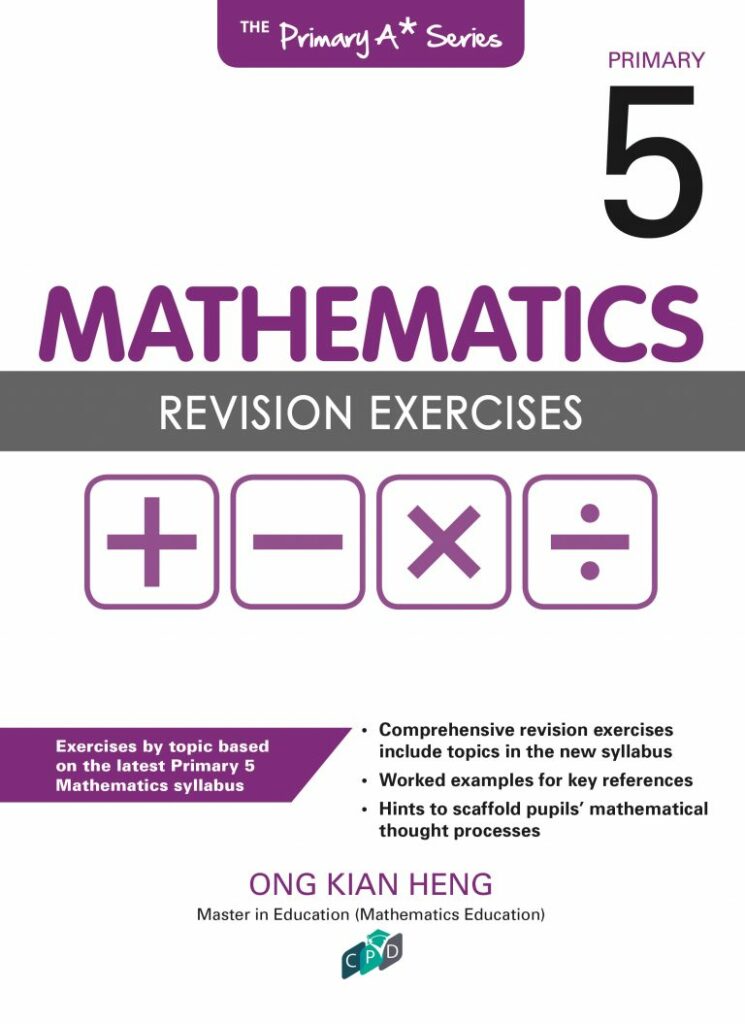Ong Kian Heng holds a Master of Education in Mathematics Education. In his more than 15 years of teaching Mathematics at the primary levels, he has written books for both international as well as local publishers. He has conducted Mathematics workshops on problem solving, heuristics and the usage of manipulatives to develop the professional capacity of practising teachers. He has also conducted Mathematics workshops for parents to equip them with the necessary mathematical knowledge to help their children in the subject. He has presented papers in various conferences, both locally and overseas.
Kian Heng is the author of Primary 5 Mathematics Revision Exercises. This book provides students with an organised approach to revising Primary Mathematics through comprehensive practices from the basic to the challenging. All topics, including new topics, in the latest Primary 5 Mathematics syllabus (2017) issued by the Ministry of Education, Singapore, are covered. Today, Kian Heng shares more about this book and his experiences.
Today, Kian Heng shares more about this book and his experiences.
About your book
- How will this book help students to master Mathematics effectively?
The learning objectives for each topic is clearly spelt out at the beginning of each chapter.
Every topic in this book has been divided into 2 sections. Section A covers the basic skills, concepts and processes needed for the whole topic.
Section B is divided into 2 exercises. The first exercise consists of short-answer questions (1 to 2 marks). The second exercise consists of longer questions that require more steps to solve (3 to 5 marks).
2. Mathematics is generally acknowledged as a ‘practice makes perfect’ type of subject. What else can students do to excel in this subject, on top of consistent practice?
Other than practice, students should learn to relate daily real-life activities to Mathematics. They should learn to see the usefulness of Mathematics and appreciate the beauty and power of Mathematics.
3. What are some mistakes that students frequently make and how can they avoid them?
Some students make mistakes frequently as some of their mathematical concepts are not correct. They have to clarify their doubts with their Math teachers.
4. What are some of the most important Mathematics concepts students should master?
The 4 basic operations of +, -, x and ÷ are the most important. Number sense is just as important.
5. How can students use the provided answer keys effectively?
Students should check their answers after each section and clarify doubts with their teachers or tutors before moving on to the next section.
6. How can students make use of the hints given for selected questions in the book to enhance their thought process?
The hints are meant to scaffold their thought processes. They are usually the first step needed to solve the math problem.
7. Lastly, do you have any other insights to share with students studying Mathematics?
Perseverance is very important. Do not give up easily when faced with a difficult problem. Do not be afraid to ask questions.
About Yourself/Work/Expertise

- Why did you choose to teach Mathematics?
I have always enjoyed Mathematics since young. I teach Mathematics because I enjoy the subject.
2. Can you share how Mathematics has evolved as a subject over the last fifteen years?
The emphasis on real-life application of Mathematics has increased over the years.
3. Are the present-day skills required to perform well in Mathematics different from the past?
Since the percentage of problems on real-life application of Mathematics has increased, students also need to be exposed to more real-life mathematical problems in order to perform well.
4. Having taught for fifteen years, which Mathematics topic do you think students have the most difficulty with?
I think students find the topic of speed difficult.
5. How can students stay positive when faced with challenging Mathematics questions?
I think they must learn to stay calm and not panic. They can skip the challenging questions first and answer the rest of the paper before solving the challenging ones.
6. Some parents also find Mathematics difficult to solve. What advice would you have for them?
They can attend Mathematics workshops organised for parents or ask teachers/tutors to enlighten them.

